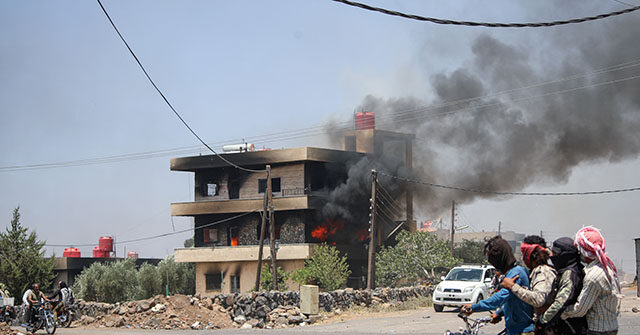Three Syrian security personnel and a Druze fighter were reportedly killed on Sunday in renewed clashes across the southern province of Sweida, while the Kurdish-led, U.S.-aligned Syrian Democratic Forces (SDF) said it fought against government troops in the northern province of Aleppo.
Sweida was the scene of a rapidly escalating conflict between Sunni Muslim Bedouin tribes and the Druze, a non-Muslim religious minority, in mid-July. The central government in Damascus sent in troops to restore the peace, but the Druze said those government forces teamed up with the Bedouin to massacre Druze.
Israel, which has its own sizable Druze population, intervened to protect the Druze of Sweida by bombing Syrian military convoys. The Trump administration brokered a ceasefire deal that left Sweida’s capital city in the hands of the Druze. Roughly 1,400 casualties had been reported by the time the ceasefire took effect.
According to Syrian state television, Druze militia fighters attacked Syrian security forces near Sweida on Saturday. A security official said the attack should be considered a violation of the ceasefire agreement reached in July, but the government in Damascus has not made such a declaration yet.
The London-based Syrian Observatory for Human Rights (SOHR) said “clashes erupted” between Syrian security forces and “local factions” around the town of Tal Hadid in western Sweida province.
Tal Hadid is serving as a stronghold for government troops deployed to monitor the region and keep the Druze separated from the Bedouin. According to various reports, between three and five government soldiers were killed in the attack. The SOHR said at least one “local fighter” was also killed.
Another battle reportedly broke out near the village of Thaala, a Druze town west of the provincial capital of Sweida, and there were reports of explosions and gunfire in Sweida itself. The SOHR said government forces bombarded Thaala with “shells and heavy weapons” in response to the Druze militia attack.
The local Druze do not see the government troops as peacekeepers, but rather as an occupying force holding Sweida under siege. Residents of the city held protests over the weekend, demanding the withdrawal of government forces and the delivery of more international humanitarian aid.
The Interior Ministry in Damascus issued a statement on Sunday denouncing “rebel gangs” for attacking Tal Hadid. The ministry said control of the area was regained by government forces after the weekend clashes.
“In contrast to the government’s efforts aimed at enhancing security and stability in Sweida, the rebel gangs have continued during the past period in media and sectarian mobilization campaigns, in an attempt to disrupt the Syrian state’s efforts towards our people in Sweida,” the statement said.
Meanwhile, the SDF said on Monday that government forces attacked four of its outposts around Dayr Hafir, a city in Aleppo.
“Our forces confronted the attack and responded as necessary in defense of our positions and fighters. Clashes ensued and continued for 20 uninterrupted minutes,” the SDF said.
Over the weekend, the Syrian defense ministry accused the SDF of launching an unprovoked rocket attack against an army outpost, while the SDF said it was responding to a wanton artillery attack against civilian targets near the city of Manbij.
“We hold the Damascus government fully responsible for this behavior, and reaffirm that our forces are now more prepared than ever to exercise their legitimate right to respond with full force and determination,” the SDF said in a statement.
The Kurdish-led group hinted that “undisciplined factions” allied with the government were responsible for the violence.
The SDF signed a deal in March to become part of the new Syrian government, but the deal did not specify how the formidable SDF militia would be integrated with the national military.
The 14-year Syrian civil war ended suddenly in December when an alliance of rebel groups led by Hayat Tahrir al-Sham, an offshoot of al-Qaeda, swept into Damascus and unseated dictator Bashar Assad. The new government has struggled to convince Western leaders, and vitally needed foreign investors, that it will respect Syria’s many ethnic and religious minorities.
The new government is strongly supported by neighboring Turkey, but is also under heavy pressure from the Turks to disarm or control Kurdish militia groups seen by Turkey as threats to its national security.
Read the full article here


